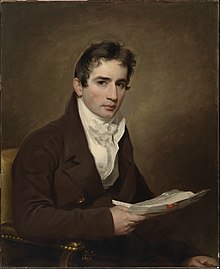John Sergeant | |
|---|---|
 Portrait of Sergeant by Thomas Sully, 1811 | |
| Chair of the House Judiciary Committee | |
| In office 1839–1841 | |
| Preceded by | Francis Thomas |
| Succeeded by | Daniel D. Barnard |
| In office 1822–1823 | |
| Preceded by | Hugh Nelson |
| Succeeded by | Hugh Nelson |
| Member of the U.S. House of Representatives from Pennsylvania | |
| In office March 4, 1837 – September 15, 1841 | |
| Preceded by | Joseph Ingersoll |
| Succeeded by | Joseph Ingersoll |
| Constituency | 2nd district |
| In office January 14, 1828 – March 3, 1829 | |
| Preceded by | Thomas Kittera |
| Succeeded by | Daniel H. Miller |
| Constituency | 2nd district |
| In office October 10, 1815 – March 3, 1823 | |
| Preceded by | Jonathan Williams |
| Succeeded by | Samuel Breck |
| Constituency | 1st district, Seat D |
| Personal details | |
| Born | December 5, 1779 Philadelphia, Pennsylvania |
| Died | November 23, 1852 (aged 72) Philadelphia, Pennsylvania, U.S. |
| Resting place | Laurel Hill Cemetery, Philadelphia, Pennsylvania, U.S. |
| Political party | Federalist (Before 1828) National Republican (1828–1834) Whig (1834–1852) |
| Spouse |
Margaretta Watmough
(after 1813) |
| Relatives | Jonathan Dickinson Sergeant (father) |
| Education | University of Pennsylvania Princeton University (BA) |
John Sergeant (December 5, 1779 – November 23, 1852) was an American politician who represented Pennsylvania in the United States House of Representatives. He was the National Republican Party's vice presidential nominee in the 1832 presidential election, serving on a ticket with Senator Henry Clay.
After graduating from Princeton University, Sergeant served in the Philadelphia government and won election to the Pennsylvania House of Representatives. As a member of the Federalist Party, he won election to the United States House of Representatives, serving from 1815 to 1823. In Congress, he supported Clay's American System and opposed the extension of slavery, voting against the Missouri Compromise.
After serving as president of the Pennsylvania Board of Canal Commissioners, Sergeant returned to Congress in 1827. He lost his 1829 re-election campaign and became a legal counsel for the Second Bank of the United States.[1] In the 1832 presidential election, the ticket of Clay and Sergeant was soundly defeated by the Democratic ticket of Andrew Jackson and Martin Van Buren. After the election, Sergeant joined the Whig Party and again returned to Congress, serving from 1837 to 1841. He was also the president of the Pennsylvania constitutional convention in 1838. He retired from public office in 1841 and resumed his law practice.
- ^ Monroe, R. Daniel (2003). The Republican Vision of John Tyler. Texas A&M University Press. p. 102. ISBN 9781585442164. Retrieved 15 October 2019.
